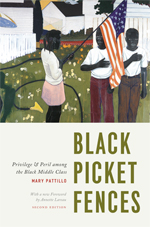| « Solo in the 2nd City @ Beauty Bar | For School the Bell Tolls: Book Club's Favorite "Back-to-School Books" » |
Reviews Mon Aug 19 2013
"Groveland," Two Decades On: Mary Pattillo Returns to Neighborhood of Black Picket Fences
 Oh, the kids. They have trouble finding and then committing to a career. The ones who do graduate college often move back in with their parents. And instead of diligently pursuing the next milestone, they're likely to spend their time hanging out with friends and chasing after the latest expensive fashion trends.
Oh, the kids. They have trouble finding and then committing to a career. The ones who do graduate college often move back in with their parents. And instead of diligently pursuing the next milestone, they're likely to spend their time hanging out with friends and chasing after the latest expensive fashion trends.
They aren't the subject of yet another trend piece about the perceived failings of millennials. Instead, they're reaching adulthood in the mid-1990s, in a black, middle-class neighborhood on Chicago's far South Side pseudonymously known as Groveland. This is the terrain of Mary Pattillo's Black Picket Fences: Privilege & Peril Among the Black Middle Class, originally published in 1999 after Pattillo spent several years living alongside the close-knit neighbors whose struggles, compromises and triumphs the book chronicles.
Although one striking characteristic of the neighborhood is the multigenerational family networks that have kept homeownership rates high and turnover low, Pattillo turns an especially attentive eye toward the younger residents. This generation ranges from slightly sheltered churchgoers to risk-takers who openly boast about their gang connections. In both cases, there may be cause for concern. Even in 1999, Pattillo senses that this generation may have a tougher time carrying on its parents' legacy of stability. Between the lines of the book there sound faint, ominous economic rumblings. When an interview subject innocently lauds the newfound ease of getting home loans, one's heart sinks. And the public-sector jobs that are the neighborhood's lifeblood already seem to be drying up.
Along with these national trends, Pattillo's subjects face concerns particular to being young, middle-class and black. Although these young adults may have been raised with as many material comforts as white middle-class kids, the pool of resources those comforts are drawn from is likely shallower; after all, they're barely two generations away from the overt institutionalized discrimination that kept their forebears from accumulating the kind of wealth needed to, say, easily finance a college education. They live in a lovely neighborhood of single-family homes and tidy lawns that, thanks to Chicago's stark geography of segregation, sits within close proximity to poorer neighborhoods where drug dealing and other kinds of lucrative criminal mischief can prove tempting. If these kids even flirt with the kinds of styles made popular by gangsta-glam pop culture, the consequences can be dire--for instance, if they happen to encounter real gang members or outsiders (police; armed community-watch members) who can't tell the difference.
The epilogue to the just-released second edition of Black Picket Fences finds Pattillo returning to Groveland to interview many of her former subjects. The economic crash has had some of the expected effects: foreclosures and layoffs have hit the area hard. Pattillo points out that African-Americans compose a disproportionately high percentage of public-sector employees and of consumers of public-sector services, meaning that although a recession may affect just about everyone, it also serves to increase the economic gap between white and black Americans. And there's another unfortunate twist: the subprime mortgage bubble was built disproportionately on the backs of black homeowners. Pattillo cites some jaw-dropping statistics: for instance, in 1998, black borrowers receiving subprime refinance mortgages outnumbered white borrowers more than six to one. (This disparity persisted even at the highest income levels.) A pattern from the days of blockbusting and white flight in the 1960s repeats itself in different form, and again African Americans achieve gains in homeownership on terms that hurt them in the long run.
The full extent of the recession's damage to Groveland is likely still unfolding. Crime rates have remained fairly steady, but the number of foreclosures and the subsequent increase in renters without longstanding ties to the neighborhood have made many of Pattillo's subjects---even those who, as youths, had seemed most comfortable with their neighborhood's potential for gangland-adjacent thrills--begin to cast their aspirations elsewhere. Now parents, they hesitate to take their young children to the same parks where they played growing up. As those who have the means aim for the suburbs or the South Loop, they may be setting off another round of segregation, this time along economic rather than color lines.
But that would be a larger story than Pattillo's current data would support. As a professor of sociology and African American studies at Northwestern, she is an impeccably scrupulous researcher and writer. More than with sweeping conclusions or policy recommendations, Black Picket Fences concerns itself with turning a detailed eye to a picture that's easily glossed over in discussions of the city's segregation. So it's an academic text but a lively one, due to her liberal use of quotes from her neighborhood informants. (For instance, "Spider," who balances jobs with the Park District and Chicago Mercantile Exchange with longtime connections to gang leaders, gets an entire chapter to himself.) Pattillo is an excellent listener, and anyone looking to expand their conception of the South Side beyond the dire stories of Englewood violence and the ivied island of Hyde Park should listen in as well.









